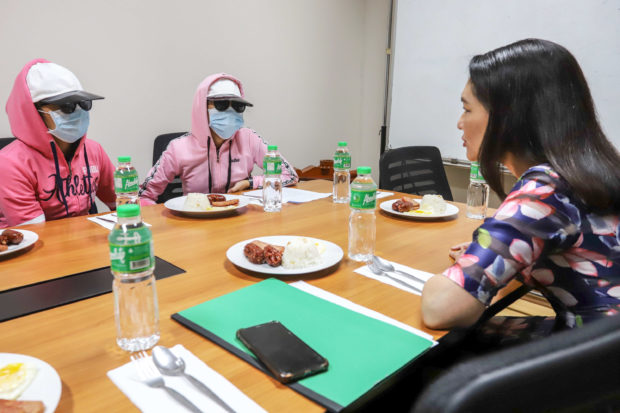
RESCUED MINORS Sen. Risa Hontiveros, chair of the Senate committee on women, children, family relations and gender equality, talks with two Filipino minors rescued from Chinese prostitution dens. —CONTRIBUTED PHOTO
MANILA, Philippines — Several travel agencies should be held criminally liable for facilitating the visas of Chinese women who have fallen prey to prostitution rings catering to male Chinese workers of Philippine offshore gaming operators (Pogos), according to Sen. Risa Hontiveros.
“These travel agencies have abused the visa-upon-arrival policy that the [Bureau of Immigration] launched in 2017,” Hontiveros said in a radio interview on Sunday.
“We will hold them accountable for profiting from the visas of illegal Pogo workers and prostituted women from China,” she said.
The government implemented the visa-upon-arrival policy to entice more Chinese tourists to visit the country.
Travel ban
But last week, immigration officials temporarily stopped issuing the visa to arriving Chinese tourists after the government ordered a ban on all travelers coming from Wuhan City and other areas in China where there are confirmed cases of the 2019 novel coronavirus.
Hontiveros on Jan. 28 presided over a Senate investigation into the rise of sex dens employing Chinese and Filipino women that came with the mushrooming of Pogos, or online gambling companies that mainly target people in mainland China.
Vicente de Guzman, deputy director of the National Bureau of Investigation, said transactions for the trafficked women were mostly done through the internet and that they were commonly being offered to Chinese citizens employed in Pogos.
Next hearing
Showing screenshots of chat groups offering sex services, Hontiveros lamented how prostituted women, including Chinese, Russians and Koreans, were being offered like food items on menus of restaurants.
Hontiveros said she would summon to the next hearing officials of the Chinese Embassy in Manila and operators of hotels that had reportedly been used for the sex trade.
Hontiveros, chair of the Senate women, children, family relations and gender equality committee, said Chinese Embassy officials had declined to extend assistance to the NBI in rescuing trafficked Chinese women.
“Up until last week, the Chinese Embassy said it was still busy to respond to the NBI’s request (for assistance),” she said.
Hontiveros said the proliferation of sex dens should prompt policymakers to take a second look at the existence of Pogos in the country, which now employ more than 130,000 workers, mostly Chinese.
Cost-benefit analysis
As disclosed by law enforcement agents, the senator said the Pogo industry had given rise to a Chinese crime wave including prostitution, killings, kidnapping for ransom, gambling and drug trafficking.
Hontiveros said the Senate hearing would help the government get a clearer picture of prostitution and human trafficking as illegal businesses that have thrived mainly due to the existence of Pogos.
“In the end ”¦ we should do a cost-benefit analysis of Pogos. We should be able to weigh its social cost to our country,” she said.
“We should be able to decide if we have to further regulate Pogos or even suspend it (because of the problems it created),” she added. “If the foreign women are being victimized (by prostitution syndicates) in our country, it should be our concern how to protect them.”Leasing, taxes, fees
The social cost of the Pogo industry is just one side of the picture.
The industry has benefited the real estate industry in the country. Demand for Pogo offices and housing for their workers has raised rental rates in Metro Manila and other parts of the country, providing real estate developers and apartment building owners more income.
The Bureau of Internal Revenue is also collecting taxes from Pogos and their workers, while state-run Philippine Amusement and Gaming Corp. is earning from licensing fees and royalties from Pogos. The taxes, fees and royalties run into billions of pesos.